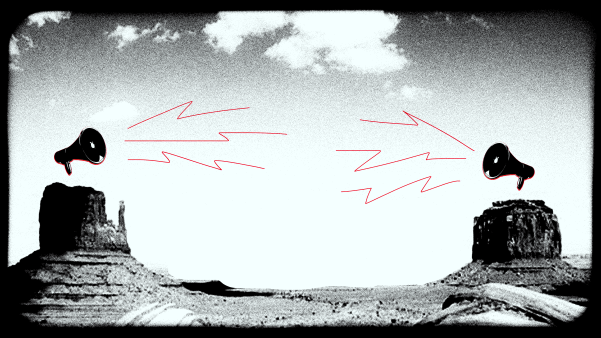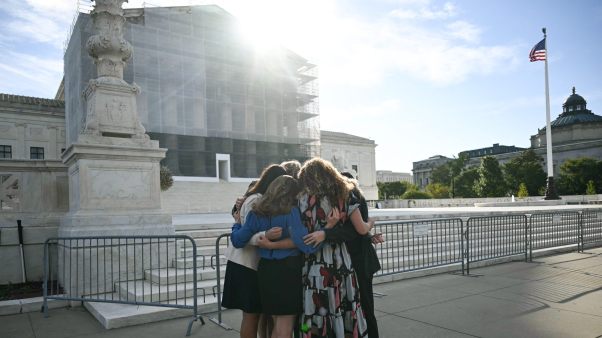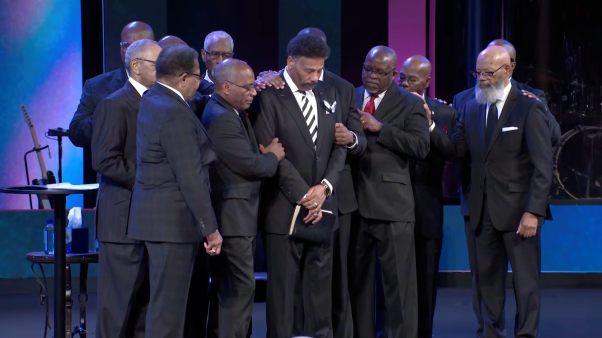I'm looking forward to Christmas—no dread of the busyness, no fear of drowning in the commercialism. I know what Christmas Eve will be like: we'll cut the tree in the afternoon and bring it in and decorate it. We'll go to church, where I will sweat with my Sunday-school class as they try to remember their lines for the pageant, and then I'll relax in the knowledge that it is the small mistakes (the drooping halo, the three-year-old shepherd using his crook as a hockey stick) that really stick most fondly in people's minds. We'll come home, read the Christmas story once more, put up our stockings, and go to bed. In the morning, we'll open the stockings and find the candies and pencils and tiny jokes inside; we'll exchange one or two homemade presents—photo albums, raspberry jam made in the summer's heat—and then we'll go outside to play in the snow, or into the kitchen, cooking for the great dinner ahead. In other words, a completely normal Christmas minus the mounds of presents.
The story of how my family arrived at this quiet and beloved Christmas (which means, of course, a much quieter December than most of our friends experience, without a single trip to the mall, and a January without a credit-card debt) has to do with many things: with carbon dioxide levels in the atmosphere, with our worries about what a consumer culture meant for our daughter—and with the conviction, nurtured by our church, that there was more real joy to be had from Christmas if only we could unplug it: more real connections with that glad day in the past, and more real hope for a troubled future.
To understand what I mean, you need to begin by looking hard at what we've done to this planet. We all know that you can guess with some accuracy a human being's behavior by looking at his physical and social surroundings. If a parent is self-absorbed, lazy, or forced by economic pressure to be absent, then a family often falls apart. On a slightly larger scale, when a community's institutions—schools, parks, churches—begin to wither, you know its people have succumbed to a kind of privatized selfishness.
And if you look at the largest measures of environmental health, you can make similar judgments. The ever-increasing levels of carbon dioxide, the steadily rising rates of ultraviolet radiation, the fast-growing list of extinctions: these testify not so much to technological failure as to human failure. We need to confront that failure in the hopes of building something new and joyful in its place.
We need to begin with a few basics. I find as I travel that there is a tendency, even among those who care about such issues, to underestimate the pressures on the natural world. We tend to list "the environment" as one issue alongside a hundred others—drugs, the deficit, and so on. But it is much more than that; it is less an issue than a context, the basic context in which we all must live our lives. And it is coming unraveled.
In the next 50 years we will probably see Earth's population hit its maximum. Toxic pollution, fossil fuel use, ozone depletion, soil erosion, and a dozen other phenomena that environmentalists have been warning us about will put enormous pressure on this planet.
In the area I study most closely, global climate change, the world's scientists are now in agreement that we have begun to warm the planet. This warming is in its very early stages—1995 was the warmest year to date, but it only reflects about a fifth of the warming the scientists say we will see by midcentury—and already you can begin to see what happens. Over 700 dead in a short Chicago heat wave. Highest grain prices in 20 years on the Chicago Board of Trade as the farmers of the world's farm belts struggle to feed an expanding population while simultaneously coping with yield-destroying high temperatures.
We do not quite realize our danger yet; the most recent presidential campaign, with its call from both sides for cutting gas taxes, is proof of that. One reason we don't is because of the casual way we have of discussing environmental problems. By grouping together everything from global warming to river pollution, we obscure crucial differences and delude ourselves as to the progress we've made.
What goes in … Although we have made major strides in addressing some ecological problems—urban air pollution, lake contamination, lead poisoning, and so on—it does not follow that this means anything about our capacity to solve other environmental problems, because those other problems are fundamentally different.
Consider what comes out of the tailpipe of a car. One byproduct of burning gas is carbon monoxide, the chief ingredient in smog—brown, dirty, dangerous to breathe, and now largely eliminated by the installation of catalytic converters; that's why Los Angeles is noticeably cleaner than it used to be.
But carbon dioxide comes pouring out that exhaust pipe, too. When you burn a gallon of gasoline, which weighs about eight pounds, you release five and a half pounds of carbon dioxide. The average car releases its own weight in CO2 annually. It is invisible, and it does nothing to us directly. But it is the chief heat-trapping gas now altering the most basic terrestrial forces on the planet—its molecular structure traps heat that would otherwise radiate back out to space. And here is the real catch: there is no catalytic converter, no technology, that can do anything about it. All you can do is drive smaller cars, and drive them less—and we, of course, are doing neither, and so the CO2 continues to build up in the atmosphere.
The difference between these two types of environmental problems—between things like smog, rivers that catch on fire, and radiation leaks from atomic plants on the one hand, and global warming, habitat destruction, and overfishing on the other—is simply this: the first is caused by some mistake, something going wrong. It can therefore be fixed with relative ease. The second is caused by things going pretty much as they should go, simply at much too high a level.
And it is those more serious and deeper problems that concern me most. We are in the fast-moving water above the rapids, and there is no way to paddle backwards. It will take all the skill and cohesion we can muster to get through intact.
Think of it in this way: we have vastly speeded up the changes in our societies and economies in the twentieth century, and seen people and communities strain, and in some cases crack, as they try to keep up. Now, as the twenty-first century dawns, we are taking the always-before-stable physical systems and forcing them to speed up just as quickly. And there is no good reason to suppose they will adapt.
Job talks back For people of faith, however, the problem is even deeper than the practical one I have described. People have always polluted—always needed to alter and manipulate the land around the places they lived or farmed. But that did not raise the deepest theological questions. Now, in the short period of 10 or 20 years, we have so quantitatively increased the scope of our alterations that they have become qualitatively different. We are altering the most basic forces of the planet's surface—the content of the sunlight, the temperature and aridity—and that brings out the most powerful questions about who is in charge.
If you wanted to give a name to this theological problem, I think you could say that we are engaged in decreation. God, before getting around to humans, created birds and sea creatures and beasts and creeping things, and he pronounced them all good; he saved a breeding pair of each aboard the ark. Now we toss them off the ark.
In the Book of Job, God speaks from the whirlwind, taunting Job's powerlessness—where were you, he asks, when I set the boundary of the oceans? Can you summon forth the rain clouds and crack them open? Job had to sit down and shut up, but increasingly we can talk right back to God. We can spit in his face, the old geezer: our habits and behaviors, by raising the temperature, now threaten to determine how high the seas rise, and where it will rain, and where it won't.
As I said at the beginning, it is our behaviors, our desires, that are really at the bottom of this mess, not our technologies.
Let's look again at global warming. Carbon dioxide is an inevitable byproduct of fossil fuel burning. If you buy an electric car and hook it up to a fossil-fuel-fired power plant, then all you've done is move the problem upstream; now the carbon dioxide pours out of the power plant's smokestack. Let's say you double the efficiency of the car's engine so it burns only half the gasoline. That's possible—in fact, we have done it over the last decade. But we have simultaneously doubled the total number of miles driven in this country, which wipes out the whole gain. A massive, much-heralded EPA project to reduce energy use by half at the American Express Corporation was wiped out by only 700 people switching from cars to Jeep Cherokees or Suburbans or those big 4×4 pickups. With the constant pushing by the electric utilities, the average American household added one of those compact fluorescent bulbs during the 1980s—and on average added seven incandescent bulbs as well, one reason that per capita electric consumption went up 11 percent on average. If you double fuel efficiency and simultaneously double the size of the economy, you get precisely nowhere.
We need technical change, but more than that we need behavioral change. Much more than we need electric cars we need buses and bicycles and the shifts in our ideas of what is desirable that would cause us to use them. The American way of life, insofar as it revolves around consumption, drives our physical problems.
Consumption is an issue uniquely suited for faith communities. Among the institutions of our society, only the church and the synagogue and the mosque can still posit some reason for human existence other than the constant accumulation of stuff. Our businesses thrive on constant growth; our politicians avoid hard choices by flogging the economy to grow more quickly (in the immortal words of William Jefferson Clinton, "It's the economy, stupid."); even our educational institutions have designed themselves to fit easily into this happy picture. We have made most important decisions—as individuals and as a nation-in recent decades by answering the question: Is it good for the economy?
Religious institutions, which grew up before this emphasis, inherited a different set of concerns—in many ways, a contradictory set of concerns—and those contradictions, among other things, have weakened the power of religion in the economic era. We profess to believe that we cannot worship both God and mammon; we profess to worship someone who told us to give away, not accumulate; we profess to follow a tradition that in its earliest and purest forms demanded communal sharing of goods and money. But we have by and large bracketed off those central portions of the message. And we are not alone in this. Virtually every religious and philosophic tradition has similar figures and similar teachings, in a line that runs from Buddha through Jesus and Francis, to Thoreau and Gandhi. Martin Luther King, Jr., said at the end of his life that it was not racism or imperialism or militarism that represented our root problem, it was materialism. But for all our pious lip service, we have regarded those people as unrealistic cranks.
This is a powerful moment for rehabilitating Christ the crank. What are the atmospheric chemists telling us? What are the climatologists saying? In many ways, the same things we have heard from Christ and his disciples: Simplicity, they say. Community. Not because it is good for our souls, or for our right relation with God, but because without simpler lives, the chances of stabilizing the planet's basic workings are slim. Because without community, the chances for buses and trains and other necessary efficiencies are nil. This confluence of the hardheaded and the softhearted may make for a powerful moment, an unpredictable time when the world could turn quickly in new directions.
* Click here for the continuation of this article.
Copyright © 1996 Christianity Today. Click for reprint information.










